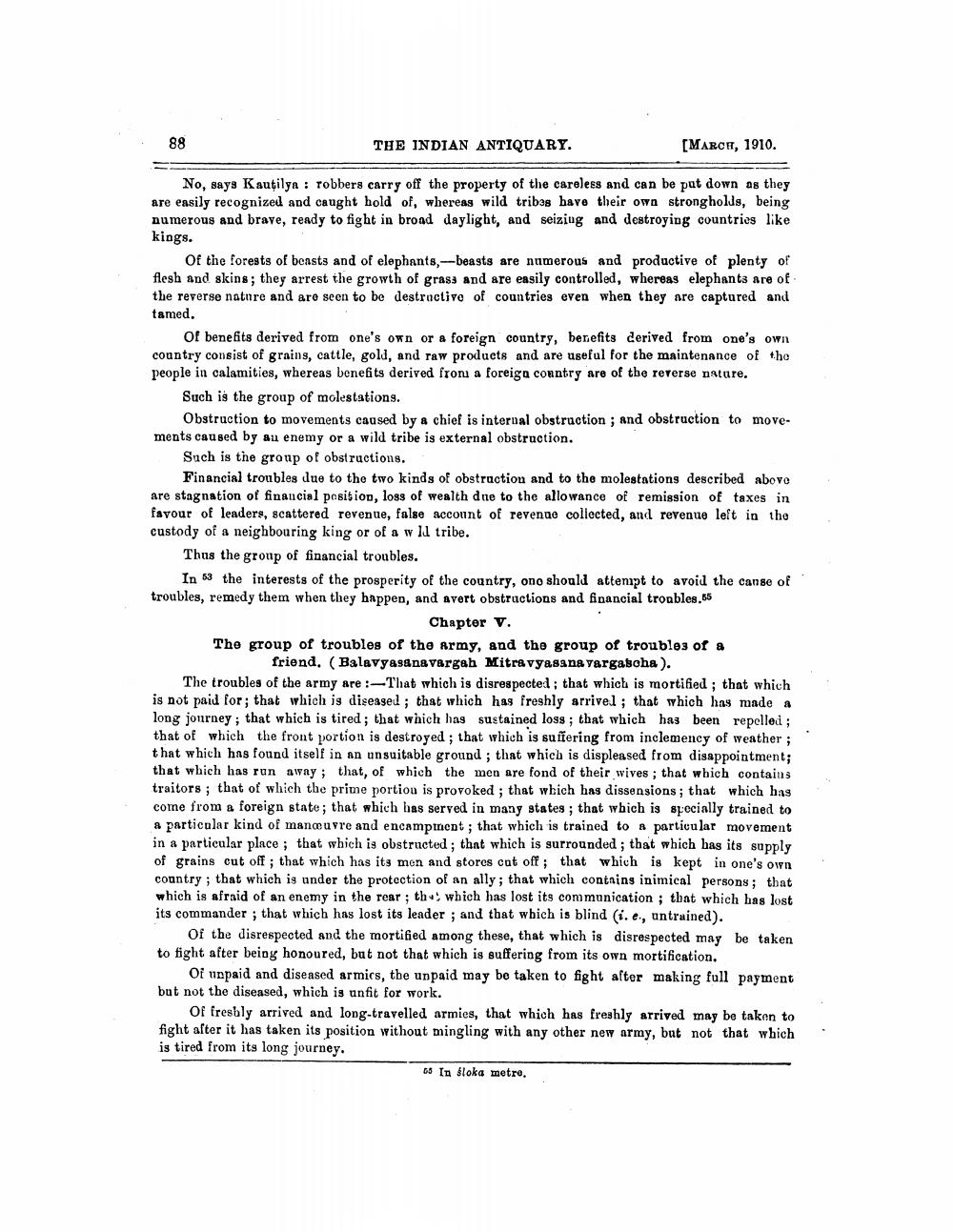________________
88
THE INDIAN ANTIQUARY.
[MARCH, 1910.
No, says Kautilya: robbers carry off the property of the careless and can be put down as they are easily recognized and caught hold of, whereas wild tribes have their own strongholds, being numerous and brave, ready to fight in broad daylight, and seizing and destroying countries like kings.
Of the forests of beasts and of elephants,-beasts are numerous and productive of plenty of flesh and skins; they arrest the growth of grass and are easily controlled, whereas elephants are of the reverse nature and are seen to be destructive of countries even when they are captured and tamed.
Of benefits derived from one's own or a foreign country, benefits derived from one's own country consist of grains, cattle, gold, and raw products and are useful for the maintenance of the people in calamities, whereas benefits derived from a foreign country are of the reverse nature.
Such is the group of molestations.
Obstruction to movements caused by a chief is interual obstruction; and obstruction to movements caused by au enemy or a wild tribe is external obstruction.
Such is the group of obstructions.
Financial troubles due to the two kinds of obstruction and to the molestations described above are stagnation of financial position, loss of wealth due to the allowance of remission of taxes in favour of leaders, scattered revenue, false account of revenue collected, and revenue left in the custody of a neighbouring king or of a w ld tribe.
Thus the group of financial troubles.
In 53 the interests of the prosperity of the country, ono should attempt to avoid the canse of troubles, remedy them when they happen, and avert obstructions and financial troubles.55
Chapter V.
The group of troubles of the army, and the group of troubles of a friend. (Balavyasanavargah Mitra vyasana vargascha).
The troubles of the army are:-That which is disrespected; that which is mortified; that which is not paid for; that which is diseased; that which has freshly arrived; that which has made a long journey; that which is tired; that which has sustained loss; that which has been repelled; that of which the front portion is destroyed; that which is suffering from inclemency of weather; that which has found itself in an unsuitable ground; that which is displeased from disappointment; that which has run away; that, of which the men are fond of their wives; that which contains traitors; that of which the prime portiou is provoked; that which has dissensions; that which has come from a foreign state; that which has served in many states; that which is specially trained to a particular kind of manoeuvre and encampment; that which is trained to a particular movement in a particular place; that which is obstructed; that which is surrounded; that which has its supply of grains cut off; that which has its men and stores cut off; that which is kept in one's own country; that which is under the protection of an ally; that which contains inimical persons; that which is afraid of an enemy in the rear; th; which has lost its communication; that which has lost its commander; that which has lost its leader; and that which is blind (i. e., untrained).
Of the disrespected and the mortified among these, that which is disrespected may be taken to fight after being honoured, but not that which is suffering from its own mortification.
Of unpaid and diseased armics, the unpaid may be taken to fight after making full payment but not the diseased, which is unfit for work.
Of freshly arrived and long-travelled armies, that which has freshly arrived may be taken to fight after it has taken its position without mingling with any other new army, but not that which is tired from its long journey.
65 In Sloka metre.




